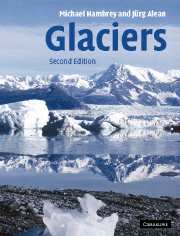Book contents
- Frontmatter
- Contents
- Preface
- Acknowledgements
- 1 Earth, the icy planet
- 2 The glacier family
- 3 Birth, growth and decay of glaciers
- 4 Fluctuating glaciers
- 5 Ice on the move
- 6 Nature's conveyor belt
- 7 Ice and water
- 8 Antarctica: the icy continent
- 9 Glaciers and volcanoes
- 10 Shaping the landscape
- 11 Glaciers and wildlife
- 12 Benefits of glaciers
- 13 Glacier hazards
- 14 Living and travelling on glaciers
- 15 Earth's glacial record
- 16 Postscript: future prospects of glaciers
- Glossary
- Select bibliography
- Location index
- Subject Index
16 - Postscript: future prospects of glaciers
Published online by Cambridge University Press: 29 March 2011
- Frontmatter
- Contents
- Preface
- Acknowledgements
- 1 Earth, the icy planet
- 2 The glacier family
- 3 Birth, growth and decay of glaciers
- 4 Fluctuating glaciers
- 5 Ice on the move
- 6 Nature's conveyor belt
- 7 Ice and water
- 8 Antarctica: the icy continent
- 9 Glaciers and volcanoes
- 10 Shaping the landscape
- 11 Glaciers and wildlife
- 12 Benefits of glaciers
- 13 Glacier hazards
- 14 Living and travelling on glaciers
- 15 Earth's glacial record
- 16 Postscript: future prospects of glaciers
- Glossary
- Select bibliography
- Location index
- Subject Index
Summary
The study of glaciers is important for many reasons, not least because of the impact they will have on all our lives in the future. Perhaps most fundamentally, glaciers and ice sheets respond to climatic change. They affect global sea level, drive ocean currents and influence atmospheric circulation. Thus glaciers have an impact on human civilization from the poles to the tropics.
At a more local level, hazardous glaciers impinge directly on the lives of people in mountain regions, and some have been responsible for huge loss of life. We need to understand them better if future catastrophes are to be averted. Despite this, glaciers provide considerable benefits to human society, notably in terms of providing water and hydro-electric power, and more aesthetically as a focus of magnificent landscapes to be appreciated by mountaineers, skiers and other tourists. However, in the context of global warming and glacier recession, major concerns are arising about the loss of water supplies and tourist amenities.
Ice cores and glacial sediments provide unequalled records of climatic evolution, both within the span of our lifetime, and on timescales of millions of years. If we can establish the environmental record of the past, we will be better placed to understand the causes of climatic and sea-level changes, and thus be in a better position for determining what may happen in the future. Predicting the future behaviour of glaciers and ice sheets requires the application of many scientific disciplines.
- Type
- Chapter
- Information
- Glaciers , pp. 335 - 351Publisher: Cambridge University PressPrint publication year: 2004



